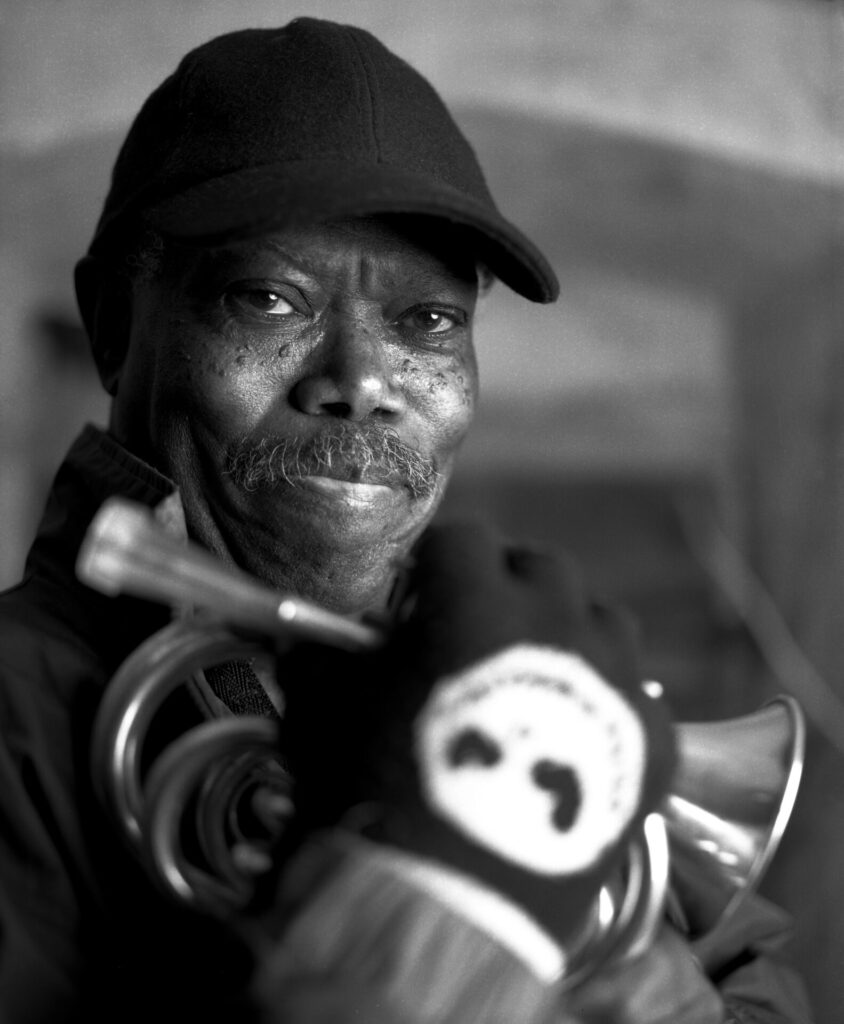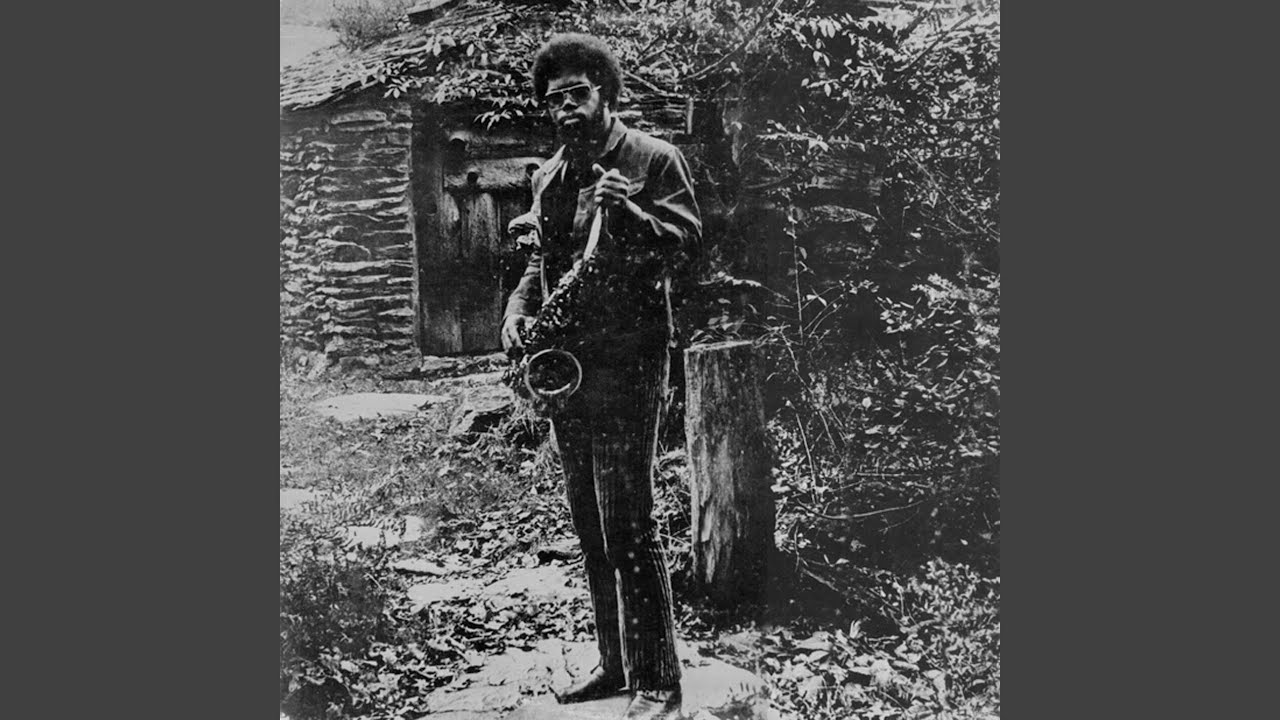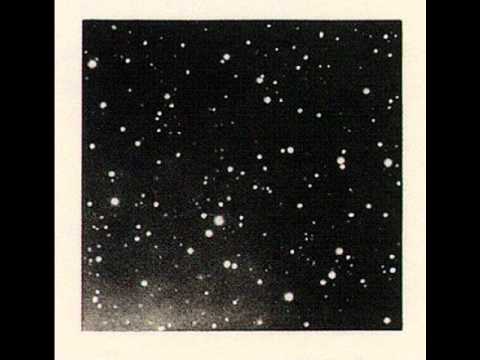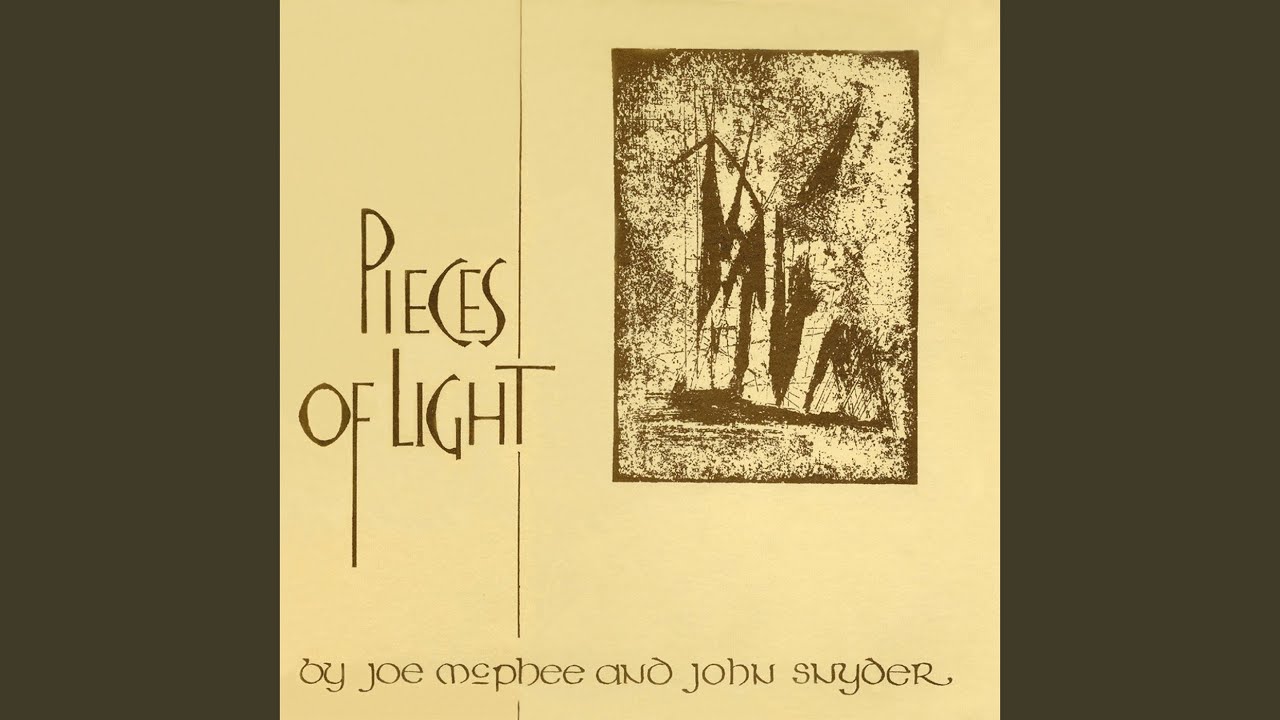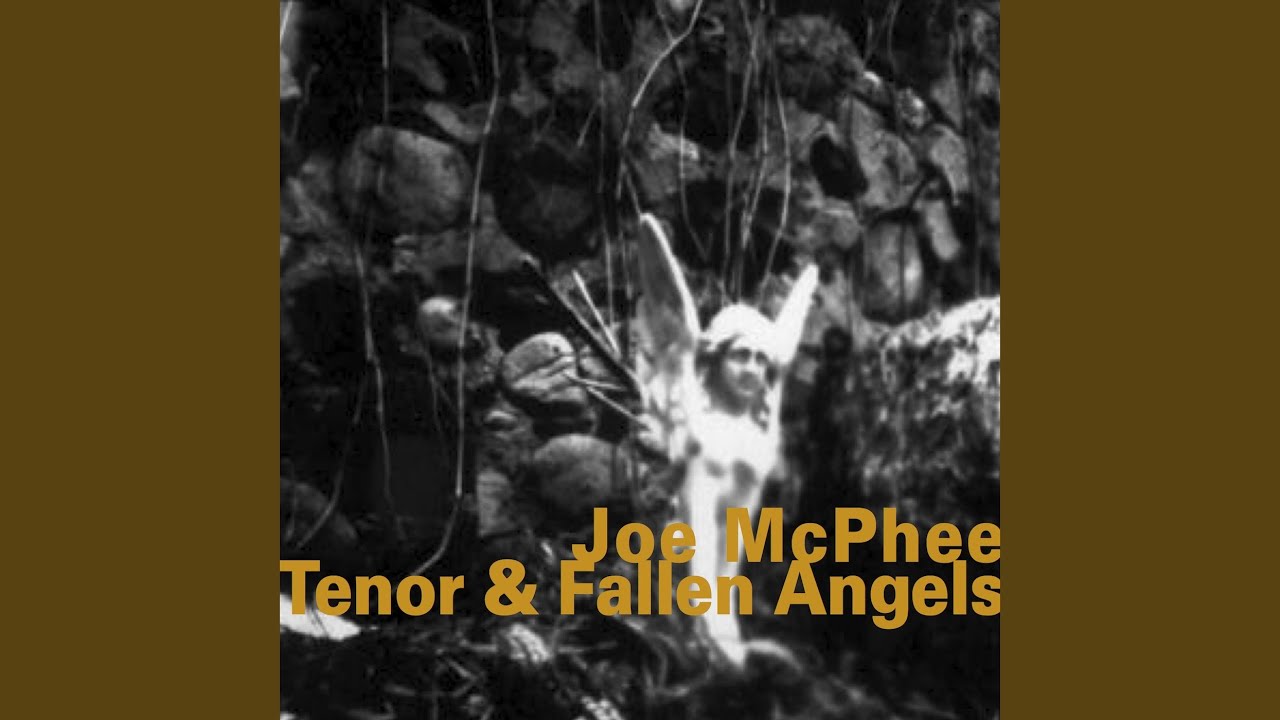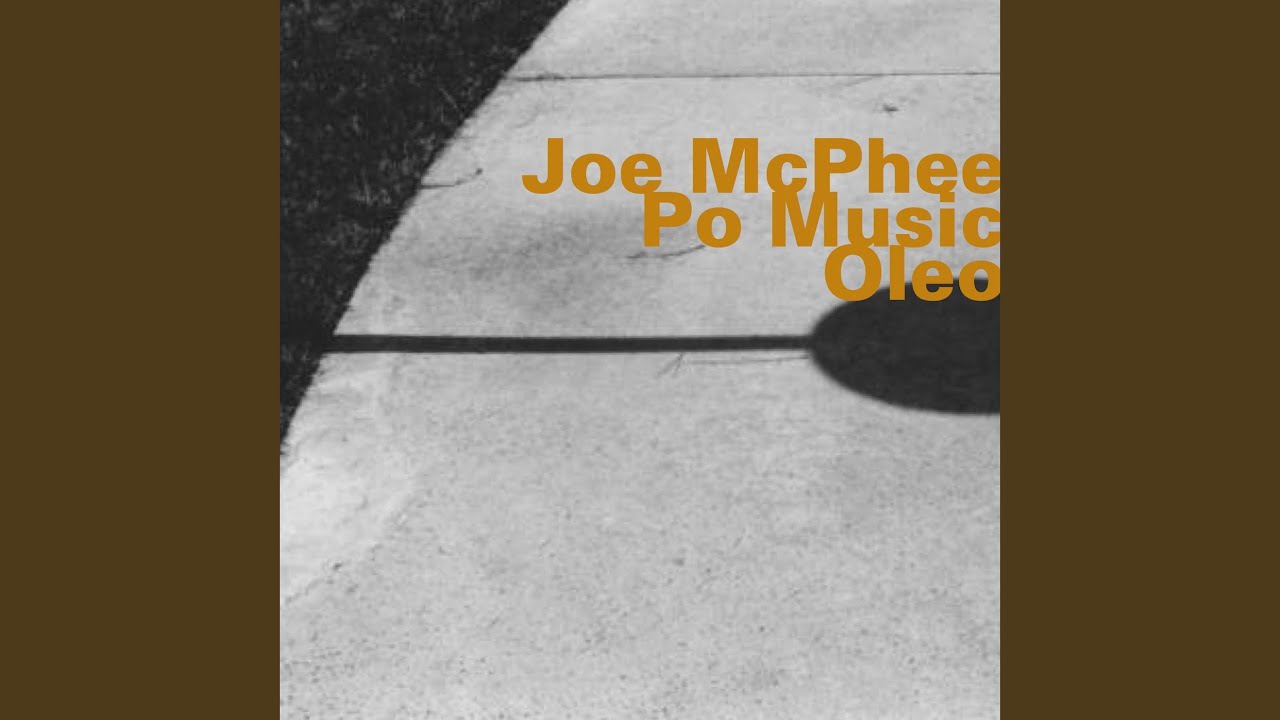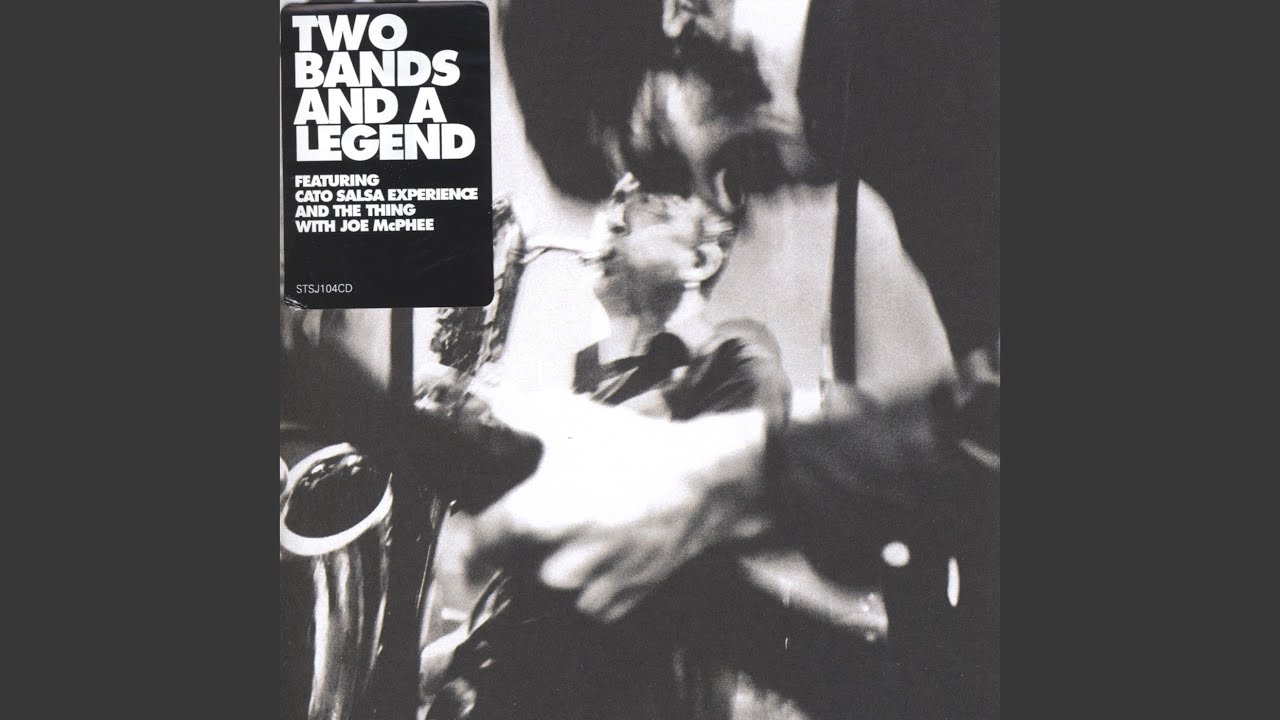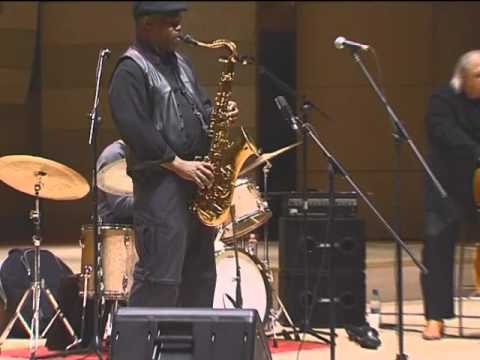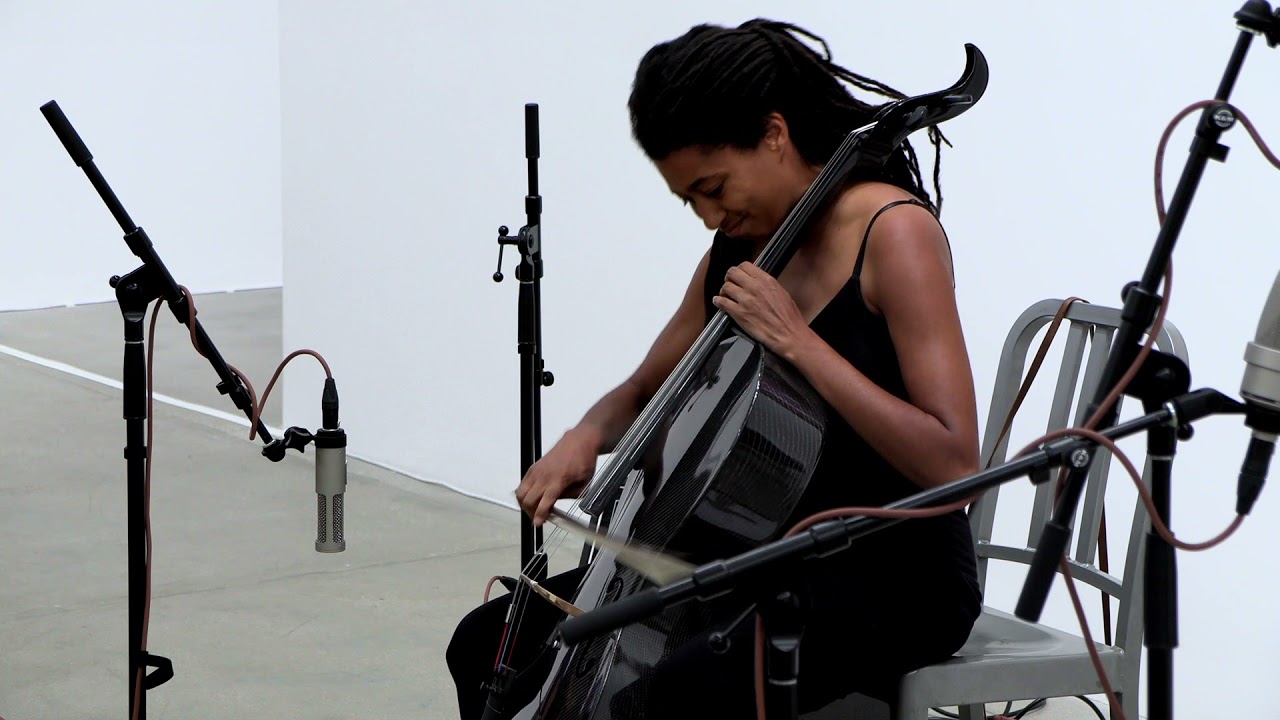A beloved figure in jazz and underground music, Joe McPhee has recently found a wider audience after his free-funk classic ‘Shakey Jake’ was featured prominently in Apple TV’s science-fiction drama Severance. Asked to choose some music as a reward for their work, the office clerks opt for “defiant jazz”. Their cheerfully sinister manager drops the needle on McPhee’s 1971 album Nation Time and leads the workers in a dance routine. It’s one of those beautifully incongruous moments where the avant-garde breaks through to the mainstream.
No one deserves it more than McPhee. The saxophonist, pocket trumpeter, trombonist, composer, improviser, poet and conceptualist is a legend of creative music whose openness and generosity of spirit make him an inspiration to musicians and audiences alike. As McPhee told me in a 2014 interview, “I’m curious about possibility.”
At 85, McPhee is still exploring possibility in concert, on record and on page. His latest release, I’m Just Sayin’, finds him exploring new electro-acoustic contexts for his poetry with Mats Gustafsson, while his recent memoir Straight Up, Without Wings reads less like a retrospective than an ongoing conversation with his community.
Born in Miami in 1939, McPhee moved to Poughkeepsie in upstate New York as a child, where he’s lived ever since. He grew up in a musical household with Caribbean music – his family is of Bahamian heritage – a major influence. Coming out of high school, McPhee refined his trumpet chops in military bands and local jazz groups. By the mid 1960s, he was a fervent free jazz head, hanging with Ornette Coleman and attending John Coltrane’s funeral.
In the late 1960s, McPhee became a Black hippy with a VW van called Afro-1. Staying in Poughkeepsie meant McPhee was one step removed from the New York Loft Jazz scene, yet that distance led him to seek out like-minded artists in the Hudson Valley and further afield. His friend, the painter and producer Craig Johnson founded the CjR label expressly to release the music McPhee was making in this period. In 1975, a Swiss pharmaceutical salesman called Werner X. Uehlinger discovered McPhee’s music during a trip to the US. He built the HatHut label around McPhee, bringing him into an international community of creative musicians.
It’s in that open field that McPhee has operated ever since, working across jazz, free improvisation and experimental musics. As his collaborator Alexander Hawkins remarks, McPhee is “a total boss when it comes to ‘soloing’ in a ‘free jazz’ context’ [but] the deeper you go into his work, I think it makes much more sense to think of him first and foremost as a conceptualist, like Roscoe Mitchell, Evan Parker, John Butcher and Matana Roberts in their very different ways.” That conceptual mindset comes through in McPhee’s early experiments with electronics and multi-track recording, his long association with Pauline Oliveros, and his literary exploits. But his major theoretical contribution is Po Music, which applies lateral thinking techniques to improvised music.
That ability to think outside the box is key to McPhee’s art. His memoir opens with a meditation on noise. “Noise interests me because it’s everywhere, and it can be organized to make what we think of as music,” he writes. “Everybody has access to it, and everybody can fashion it anyway they want to.” A beautiful example is 2021’s Route 84 Quarantine Blues (2021), with its Covid era field recordings and a rhythm track made from a tap dripping on a pie tin. Or take 2019’s At The Hill of James Magee, where McPhee and fellow saxophonist John Butcher explore the eponymous artwork in the Texas desert, bouncing their tones off the iron doors and responding to environmental sounds.
Choosing 10 points of entry to such a vast and varied catalogue is a near impossible task, but hopefully the following selections open key aspects of McPhee’s musical flight. I’ve decided to stick to projects where McPhee is leader or featured guest, and it pains me to leave out some of his most valued collaborators of recent years, including Chris Corsano, Ken Vandermark and Hamid Drake, as well as beautiful encounters with the late pedal steel virtuoso Susan Alcorn or saxophonist Mette Rasmussen and tape mangler Dennis Tyfus. Then there’s the stuff that’s frustratingly out of print, like 2019’s outrageous sound art/basement party Live In The Batcave. But it’s all out there ready to be discovered. Take McPhee’s advice: “I will go where the wild goose goes!”
‘Shakey Jake’, from Nation Time (1971)
Beginning with 1969’s Underground Railroad, McPhee’s early albums for CjR are subterranean free jazz classics, featuring underrated musicians from the small but fertile Poughkeepsie scene. Infused with funk and soul, Nation Time is an ideal place to start with McPhee. As Mats Gustafsson told me when I interviewed him for tQ’s Baker’s Dozen feature in 2014, “In a way it’s a perfect introduction to crazy music, and it’s as deep as [Albert Ayler’s] Spiritual Unity.” Gustafsson admits he first picked up the album, “because I thought the cover looked amazingly cool.” And who can blame him? Resplendent in Afro, sunglasses, leather jacket and bootcut jeans, McPhee holds his tenor saxophone close, ready to deliver his revolutionary art to the people.
“Nation Time was recorded in concert in 1970 while I was teaching a course at Vassar College [Poughkeepsie], called Revolution in Sound,” McPhee recalled in 2014, “It was at the height of the American rights movement and was inspired [by] and a tribute to Amiri Baraka. Today I think of it more from a human rights perspective, encompassing more than race. This is an issue that I am constantly interested in revisiting. It is a work in progress which will never be finished.”
The title track bristles with energy, as McPhee rides Bruce Thompson and Ernest Bostic’s propulsive grooves. “What time is it?” he hollers at the crowd, “it’s nation time!” The side-long title track is followed by ‘Shakey Jake’, where Mike Kull’s nagging electric piano and Dave Jones’ clipped guitar bring James Brown’s funk into a free jazz context. Over time, the shuffle-strut groove only gains intensity, with McPhee and altoist Otis Greene blowing in soulful free counterpoint. Harnessing the liberatory power of dance and free jazz, this is “defiant jazz” in excelsis.
‘Cosmic Love’, from Sound On Sound (1970)
The revelatory Sound On Sound gathers McPhee’s home-recordings from 1968 to 1973. Assisted by Craig Johnson, McPhee plays tenor and soprano saxophone, recorders, flute, Space Organ, Nagoya harp, hand percussion and kalimba. He also experiments with multi-track recording, microphone feedback and Echoplex, taking his music into extraordinary electro-acoustic realms. Informed by Stockhausen, Sun Ra, Lukas Foss and Harry Partch, the collection underlines McPhee’s openness as a listener and creator, as he organises sound with great sensitivity and boundless imagination. The deeply beautiful ‘Cosmic Love’ features McPhee improvising on tenor over a glacially paced organ vamp. The meditative quality and modal form align the piece with the spiritual jazz of the era, but what sets it apart is its intimacy and strangeness, as McPhee spins gorgeous melodies out into emotionally raw abstractions.
“It’s curious, why cosmic love?” says McPhee via phone in 2025. “Space Organ was this bizarre organ that I bought, because my brother and I were going to have a group, but he never really took to the organ. I totally destroyed it, put guitar effects on it. It was a parlour organ, but it became the Space Organ because of Sun Ra.”
‘Shadow Sculptures’, from Pieces Of Light (1974)
In the mid 1960s, McPhee attended a Moog synthesiser demonstration, sparking an interest in electronic music that would lead to his collaboration with synth player John Snyder in the 1970s. A key challenge for early electronic improvisers was to be as fluid and expressive as their acoustic partners. Snyder coaxes a compelling range of sounds from his ARP synthesiser, leading to some inspired contributions from McPhee. On ‘Les Heros Sont Fatigues’, McPhee’s pocket trumpet is harried by percussive static, buzzing mosquitos and ray guns, while ‘Colors in Crystal’ has McPhee alternating between trumpet and saxophone while Snyder plays keening sine tones, low drones and pulsars. The standout is ‘Shadow Sculptures’, where the duo conjure a beautiful alien atmosphere from pocket trumpet, modified Nagoya harp and wisps of synth. If you dig this, get straight onto The Willisau Concert, where the duo are joined by South African drummer Makaya Ntshoko for an amazing set that includes proto acid-house bubbler ‘Bahamanian Folksong’.
‘Knox’, from Tenor (1977)
McPhee’s first solo album, Tenor is a masterpiece of unaccompanied saxophone. “It was inspired by For Alto by [Anthony] Braxton, and I wanted it to be very different,” says McPhee. The first ever solo saxophone record, Braxton’s 1969 double album was a radical, rigorous and urgent statement of intent. Unaccompanied solo improvisation is one of the greatest challenges a musician can face, and McPhee rises to it magnificently. Without other musicians to play off, the performer enters into a dialogue with their instrument. As McPhee puts it, “I was trying to find the flavour of the tenor.” On the opening ‘Knox’, he does this by carefully working over a gutsy blues motif, exploring new timbral and emotional dimensions in the process. By moving up the register, McPhee brings a delicate lyricism to the material, as exquisite melodic phrases morph into abstract moans and woozy pitch bends. It’s an utterly gorgeous and compelling performance, setting up the listener for the epic title track, where McPhee interrogates his tenor language with astonishing invention and intensity.
‘Oleo [Take One]’, from Oleo (1983)
McPhee introduced the concept of Po Music in 1981, and over the next decade released a handful of Po Music albums featuring a rotating cast of players from the Hat Hut family. On Oleo, he’s joined by three great French improvisers: clarinettist and alto saxophonist André Jaume, guitarist Raymond Boni and bassist François Mechali. “Po Music is in simplest terms about possibility,” McPhee explained to me in 2014. “It is derived from Dr. Edward de Bono’s theory of lateral thinking which allows one to discover new ideas while in the process of exploring old ones. In my version of [Sonny Rollins’] ‘Oleo’, we use the tune as source material, it is out of the bebop tradition. I’m not a bebop player, that is another life. In our exploration, we travel a different road, go in a different direction but in the process make discoveries along the way.”
Reflecting on the recording today, McPhee notes that he didn’t want to copy the original, but “wanted it to be clear that we were playing it straight.” McPhee, Jaume and Mechali kick off the first take with a brisk statement of the theme, before Boni beams in a transmission from the future. Saturated in flanger and reverb, his guitar sounds like a robot tooting a slide whistle. It’s exactly the kind of provocation Po Music thrives on. The group respond with great sensitivity and imagination, honouring Rollins’ composition while bringing new life to it. ‘Oleo [Take 2]’ is wilder and looser, the guitar fizzing like a bottle rocket while McPhee and Jaume tie knots around each other. Across the album, the drummerless format gives the music a beautiful sense of space, with the rubato drawing out the aching Iberian romanticism of ‘Pablo’. Boni brings a psychedelic blues feel to the Ayler-esque folk forms of ‘Astral Spirits’, his pentatonic licks and chugging riffs anchoring the stirring unison theme without locking it into strict metre.
‘First Movement’, from Unquenchable Fire (2003)
In his memoir, McPhee describes Pauline Oliveros as “a karate expert, a philosopher, a poet, an artist, and the most wonderful person in the world.” Of his first meeting with the great composer and electronic music pioneer, he writes, “she was drinking bourbon like a sailor on leave. Oh my God, I love this woman.” Oliveros’s Deep Listening theories had a significant impact on McPhee, encouraging him to develop his interest in extended techniques and electronics. In 1997, Oliveros’ Deep Listening Institute commissioned McPhee to write Unquenchable Fire, a work inspired by Rachel Pollack’s feminist science fiction novel of the same name. Between musical sections, Pollack reads passages from the book, her imagery of fire, nature and metamorphosis framing what we’re about to hear. Across four movements, the avant-garde chamber jazz of McPhee’s quartet (Joe Giardullo on flutes and bass clarinet, Monica Wilson on cello, Karen Jurgens on drums) is deftly integrated with the electro-acoustic timbral explorations of the Deep Listening Band (Oliveros on accordion, Stuart Dempster on trombone and didgeridoo, David Gamper on flutes, keyboard and electronics). The result is a genuine dialogue, rather than a grafting together of distinct styles. ‘First Movement’ is primarily scored for the Quartet, with the musicians improvising on McPhee’s compositional framework. There’s abundant evidence of McPhee’s skill as a composer and arranger. Notice how the flutes add colour to Wilson’s darkly elegant cello lines in the first section, or how McPhee’s smoky alto rises over the nasal choking of Giardullo’s bass clarinet in the second. The agitated cross-rhythms of the third section set up the entrance of the Deep Listening Band in the fourth, whose drones deepen the texture and slow down the pace. Stick around for the whole piece, as Oliveros breaks out the accordion, and the two groups engage in a series of gnarly electro-acoustic throwdowns interspersed with lyrical passages.
‘Louie Louie’, from Two Bands And A Legend (2005)
McPhee met Swedish sax wrangler Mats Gustafsson through Peter Brötzmann’s Chicago Octet/Tentet in 1997. “He’s the best teacher I could ever have,” says Gustafsson. That led to him guesting with Gustafsson, bassist Ingebrigt Håker-Flaten and drummer Paal Nilssen-Love’s punk-jazz trio The Thing on 2001’s She Knows… where McPhee’s bluesy pocket trumpet heralds a slow-burning take on PJ Harvey’s ‘To Bring You My Love’. Their interest in combining free jazz and rock reached its apex on their collaborations with Norwegian garage rock group The Cato Salsa Experience. Jazz covers of rock tunes can be painfully kitsch (yes The Bad Plus, I’m talking to you) but The Thing understand that in both free jazz and rock & roll, if you lay down a killer riff, you can have all manner of chaos on top.
“I didn’t like rock & roll in the day. I was a snob. I was a jazz person,” explains McPhee. “I was not at all familiar with the material, I learned to fly like a bird falling out of a nest. But I had a long history of playing in a soul / rock / jazz band called Ira And The Soul Project from the late 60s to mid 70s. I personally don’t change my approach to the material.”
Two Bands And A Legend boasts great versions of tunes by PJ Harvey, The Cramps, James Blood Ulmer and Mongezi Feza, but it’s on the 1960s garage rock nuggets where our heroes let it all hang out. They grind, stomp and wail through The Sonics’ ‘The Witch’ and turn ‘Louie Louie’ inside out. In an inspired move, McPhee and Gustafsson open with a sputtering sax duel that pays no heed to the source material, so when that dunderheaded riff finally kicks in, it’s immensely satisfying. Singer and guitarist Cato Thomassen leads the ensemble through a raggedly energetic cover that combines the best elements of The Kingsmen and The Sonics’ versions, with Gustafsson’s baritone sax adding bar-walking R&B heft. Then with a desperate “we gotta go” the ship falls off the map completely. McPhee and Bård Enerstad find themselves stranded on an island with only a pocket trumpet and theremin for company. Their agitated snuffles, bloops and whelps summon a Viking fleet of drummers, who take them back to port for one last rowdy chorus. Skål!
‘Visions of War / Valentines In A Fog Of War’, from Live In Vilnius (2008)
Formed in the late 1990s, Trio X was one of McPhee’s greatest groups, coming to a premature end with the passing of bassist Dominic Duval in 2016. Completed by drummer Jay Rosen, the trio made its debut with 1998’s Rapture, establishing their reputation for near-telepathic interplay. Whether extemporising on blues, gospel and jazz standards, or improvising freely, Trio X combined advanced musical language with emotional weight.
While McPhee was ostensibly the leader, this was a band of equals, with each member contributing their own compositions. ‘Visions Of War’, the solo piece that opens this magnificent 2006 concert from Vilnius, demonstrates what an extraordinary bassist Duval was, his melodic and highly inventive lines giving the instrument the quality of a lead voice. Rosen’s intricate brushwork guides the transition into ‘Valentines In A Fog Of War’, a piece inspired by the Rodgers and Hart standard ‘My Funny Valentine’ and Edwin Starr’s Motown stomper ‘War’. Quoting from and building on both tunes, McPhee plays tenor with great sensitivity, responding to the tension created by Duval’s springy glisses and Rosen’s taut flurries with a restrained urgency that is deeply moving.
‘AC’, from AC/DC (2020)
“I love playing with Decoy,” McPhee told me in 2014. “I’ve long been a fan of the Hammond B-3. We had one with The Soul Project, so it was like coming home for me. What a wonderful, powerful instrument. I’m a big fan of Jimmy Smith and Larry Young in particular and Alexander Hawkins is carving his own way out of that lineage.”
Some of McPhee’s most exciting music of the past 15 years has been with the organ trio Decoy: Alex Hawkins, bassist John Edwards, drummer Steve Noble. AC/DC documents their closing set from McPhee’s remarkable 2019 residency at Cafe OTO. Hawkins has the history of jazz organ at his fingertips – Sun Ra’s satellite blips, Larry Young’s ecstatic heat, Jimmy Smith’s soul jazz licks – plus plenty of ideas of his own. Edwards and Noble are equally inspired, stretching time, wrenching unheard sounds from their instruments, and bringing the funk when called for. Shaping it all is McPhee on pocket trumpet, tenor sax and occasional vocals.
The gorgeously abstract opening has McPhee’s pocket trumpet evoking beams of light through a submerged forest. He lays out for a couple of minutes while Decoy stoke the engine. His entrance on tenor sax is gloriously gnarly, a real ‘punch the air’ moment. Later on, McPhee and Hawkins channel the spirit of ‘Cosmic Love’ with gorgeous tenor balladry over an organ shimmer. It’s an amazing set, taking in gospel rave ups, R&B vamps and journeys to the beyond.
“[McPhee] is a beautiful presence on stage and that shapes the music in a very real way,” says Hawkins. “Even when he isn’t playing, he’s affecting the ensemble dynamic: creating a situation where everyone in the group can sound like themselves but still find new territories. I don’t think any of us would play in this way without his presence, and yet I think we’re all recognisable. So, he’s creating a situation where people are truly improvising and playing the moment at hand.” Hawkins notes that despite McPhee’s freewheeling approach to playing, he has a real sense of architecture. “He really ‘deploys’ himself and lays out for long periods as a way of highlighting what just happened, and of setting up what’s about to happen. Listen to the way he waits for his moment with that first tenor entrance!”
‘Alone Together/Nation Time’, from Let Our Rejoicing Rise (2022)
McPhee has long woven his poetry into his performances, but in recent years, it’s come into the foreground. On 2024’s Musings Of A Bahamian Son, McPhee performs a full programme of his poetry, joining Ken Vandermark on the musical interludes. With that rich voice and impeccable timing, McPhee is a fantastic reader. His poems range from tributes to musical and literary heroes, to reflections on life, politics and art.
Recorded live in Chicago on 19 June 2021 – the first time Juneteenth had been declared a national holiday – Let Our Rejoicing Rise is emotionally and politically charged. Performing with the brilliant cellist Tomeka Reid, McPhee opens the concert with readings of two poems, the Covid threnody ‘Alone Together’ and ‘Nation Time’. Dedicated to Amiri Baraka, the latter poem updates his classic track by responding to the moment: “a racist fascist in our White House, neo-Nazis in our streets, we’ve got miles to go, promises to keep… It’s nation time. For real this time.” McPhee rages against police brutality (“get off our necks”) and the right-wing attack on hard-won civil rights, before offering an urgent and radically inclusive expansion of the original ‘Nation Time’ refrain: “to our queer brothers and sisters, it’s nation time. To our Black, brown and beige brothers and sisters, it’s nation time…” It’s a beautiful expression of solidarity. “What time is it? It’s nation time, for real this time.”
Defiant Jazz: A Joe McPhee Taster will be released on Corbett vs Dempsey in the autumn.
Special thanks to John Corbett for facilitating the 2025 McPhee interview

